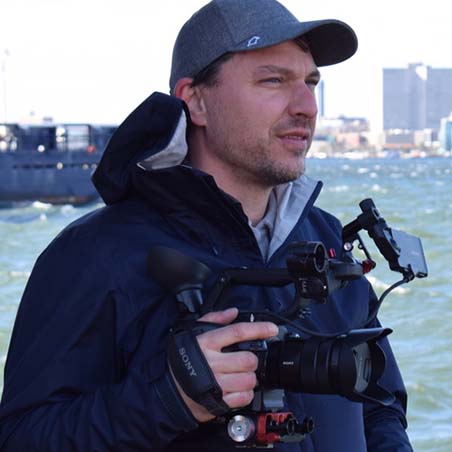Scott Simpson
Filmmaker, Playmaker Films
Bachelor of Arts, 1993; Advanced Major Certificate, 1995
It's cliché but King's made me believe that anything was possible.
Reflecting on their lives, it’s not unusual for someone to credit a specific moment or decision with changing the direction of their life in a way they couldn’t have anticipated. While at King’s, Scott Simpson came to one such fork in the road. After a miscalculation meant he was one credit short of graduation, Scott decided to return for a fifth year to take two classes—one of which ultimately set the course of his entire career.
“I was finishing my political science and economics degree and absolutely hating it… I wanted to do something totally different. I took two classes to get my Advanced Major Certificate and decided ‘I’m either going to become an architect or a filmmaker’ so I took an architecture class and a film class,” he says.
The film class transfixed him immediately.
“It was the first time in my five years that I was early for class: front row, hand up in the air, can’t wait to do the work. It was great, I loved it.”
Despite growing up just north of Manhattan, NY, Scott lived in the suburbs and associated New York with theatre and music—film seemed like a distant pursuit reserved only for those out west.
“I always thought movies were only made in Hollywood! They just seemed like things that were thought up in a dream factory in Los Angeles… It was actually through that film class that I learned there was a film community in Halifax at the time.”
Filmmaker Paul Donovan came to speak to the students during one class and a conversation with him after the session was what put the Atlantic Film Cooperative (AFCOOP) on Scott’s radar.
“I wandered down there one Tuesday evening and enjoyed an introductory film class, then I found out that NSCAD had a continuing education video production class, so I signed up for that. I sort of pieced together my own little film school.”
During the early-mid 90s, Nova Scotia’s film industry was booming with major studio films like The Scarlet Letter (1995) and Dolores Claiborne (1995) being shot in Nova Scotia. Through AFCOOP, Scott took advantage of any opportunity to work on set.
“One job led to another and another and pretty soon I had worked on a movie, on a documentary, a couple music videos and then I worked on This Hour Has 22 Minutes for two years. And at that point that was my full-time job.”
Scott’s first short film, Terminal Lunch (1997), received some awards and caught the attention of the CBC, leading to even more opportunities, and eventually he started his own company, Playmaker Films.
But when the provincial government cancelled the Nova Scotia film industry tax credit in 2014, he says things changed. “I was heavily involved in that frontline conflict with the government and it changed some of my outlook personally.” Meanwhile his wife, King’s alumna Laura Simpson, BJ’04, had been going through her own career transition.
“Those two things happened at the same time, so we realigned our priorities,” Scott explains. “I wanted her to have the opportunities that I had … and try to build something on her own. So I dedicated all of my focus to getting solid work as a writer/director and taking care of our kids.”
In 2017 things picked up when the National Film Board (NFB) came calling. They wanted to launch a project called Ocean School.
Ocean School is geared toward students in grades 6-9 and offers teachers “free online digital media learning tools for schools in, on, and around the ocean,” Scott explains. Scott creates the media content, including short documentary videos, and also collaborates with others who work on interactive aspects of the project, like digital games. Though the project is largely made for Canadian schools, it has also been used by museums and other schools across the world, including in Costa Rica, Indonesia and is now entering the US market.
“I’ve personally made more content in the past four years than I have in my entire career. I think we’re at 70 short documentaries now.”
Scott points out that it’s a testament to the quality of education he received, the enthusiasm from his professors and the ability to experiment that led him to what is now a successful career in film.
“It’s cliché but King’s made me believe that anything was possible,” he continues. “What I have discovered is that you may not be the next astronaut, but you may be the next designer of the Mars Rover.
“I always wanted to be a musician. I may not have become a rock star, but I’ve made some 25 music videos, filmed live concerts and had the chance to work with musicians and be on stage with a camera in ways that I never thought I would as a kid playing a tennis racket. Filmmaking was the venue for that thirst for experience.”
That desire to experience the world, capture its essence and share it with others will doubtless continue to lead Scott to success and act as a reminder to us all that the world is filled with opportunities to achieve your dreams, even those you initially thought were only possible in Hollywood.
